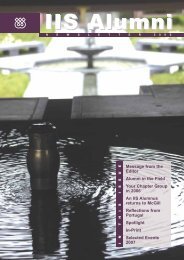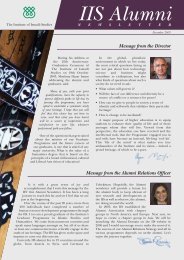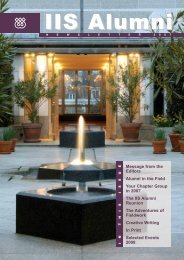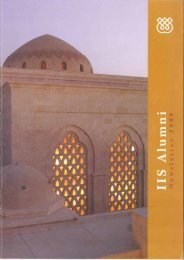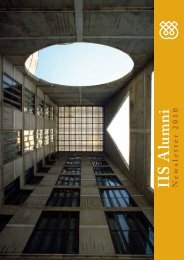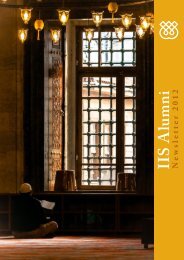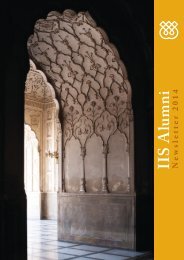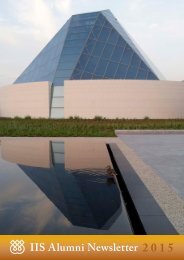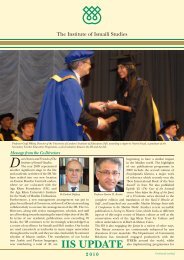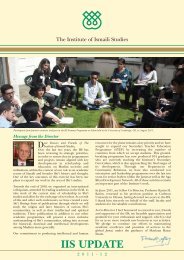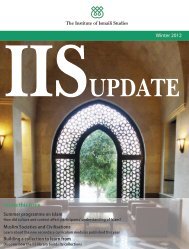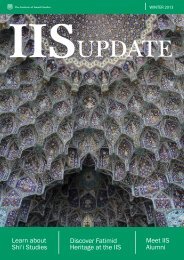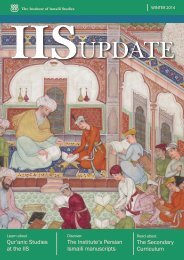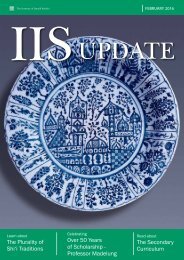IIS Continuing Education Programme 2019
Explore the short courses offered by The Institute of Ismaili Studies. These courses are designed to introduce participants to a social, cultural and civilisational approach to the study of Islam and Muslim societies, with a particular focus on Ismaili contexts.
Explore the short courses offered by The Institute of Ismaili Studies. These courses are designed to introduce participants to a social, cultural and civilisational approach to the study of Islam and Muslim societies, with a particular focus on Ismaili contexts.
Create successful ePaper yourself
Turn your PDF publications into a flip-book with our unique Google optimized e-Paper software.
<strong>Continuing</strong> <strong>Education</strong><br />
<strong>Programme</strong><br />
Course Catalogue<br />
<strong>2019</strong>
Welcome 02<br />
The Institute of Ismaili Studies 03<br />
<strong>Continuing</strong> <strong>Education</strong> <strong>Programme</strong> 04<br />
Introduction to Islam 05<br />
Shi‘i Islam: Thought, Beliefs and Practices 06<br />
The Shari‘a: Development of Fiqh 07<br />
and Ethics in Muslim Contexts<br />
Trends in <strong>Education</strong> about Islam: 08<br />
Opportunities and Challenges<br />
The Qur’an and its Interpretations 09<br />
Exploring Ismaili History: Walking in 10<br />
the footsteps of the Fatimids<br />
Course Directors’ Profiles 12<br />
Participant Accommodation 15<br />
Key Dates to Remember 16
What some describe as a clash of civilisation in<br />
our modern world is, in my view, a clash of ignorances.<br />
This is why education about religious and cultural<br />
heritage is so critically important – and why we will<br />
continue to invest in these institutions. We deeply believe<br />
that scholarship, publication and instruction – of high<br />
quality and generous breadth – can provide important<br />
pathways towards a more pluralistic and peaceful world.<br />
His Highness the Aga Khan<br />
Chairman of the Board of Governors of the The Institute of Ismaili Studies, London, UK<br />
3 July 2008<br />
1
Welcome<br />
societies. This is a learning opportunity open to<br />
wider Jamati audiences, leaders and professionals,<br />
including teachers, educators and waezeens<br />
working with Ismaili community institutions.<br />
The Institute of Ismaili Studies, established in<br />
1977 by His Highness the Aga Khan, has over<br />
the past several years offered a number of short<br />
courses for a wide range of constituencies. As<br />
part of <strong>IIS</strong>’s <strong>Continuing</strong> <strong>Education</strong> <strong>Programme</strong>s<br />
(CEP), we are pleased to offer six short<br />
residential courses in <strong>2019</strong>.<br />
These short courses aim to offer participants<br />
an academically rigorous curriculum, accessible<br />
resources and a stellar faculty to explore and<br />
understand issues related to Islam and Muslim<br />
I am also delighted to inform you that these short<br />
courses will be offered at the Aga Khan Centre in<br />
London and participants in CEP courses (<strong>2019</strong>)<br />
will be amongst the first to attend the academic<br />
courses in this beautiful building. The Aga Khan<br />
Centre is a Diamond Jubilee initiative and was<br />
inaugurated in June 2018 by His Royal Highness<br />
The Prince of Wales in the presence of His<br />
Highness the Aga Khan.<br />
Those attending the courses will be<br />
accommodated at nearby Victoria Hall, the<br />
student hall of residence. We are confident<br />
that your participation in the <strong>IIS</strong> CEP will be a<br />
rewarding and enriching experience. We look<br />
forward to welcoming you at the Aga Khan<br />
Centre in London.<br />
Dr. Farhad Daftary<br />
Co-Director,<br />
The Institute of Ismaili Studies<br />
2
The Institute of Ismaili Studies<br />
The Institute of Ismaili Studies (<strong>IIS</strong>) was established in London with the objective of<br />
promoting scholarship and learning on Muslim cultures and societies, historical as well<br />
as contemporary, and a better understanding of their relationship with other societies<br />
and faiths.<br />
The <strong>IIS</strong>’s founding aim was defined by a basic and<br />
continuing re-assessment of existing scholarly<br />
endeavour in the field of Islamic Studies. As part<br />
of this aim, the Institute seeks to draw the most<br />
effective tools developed, in modern academic<br />
scholarship over the past century. Simultaneously,<br />
in actively seeking to bring the fruits of such<br />
scholarship to bear on the conditions and<br />
aspirations of Muslim societies today (including,<br />
present-day Ismaili communities), the Institute’s<br />
programmes are attuned to the principles of<br />
objective inquiry and research while refl ecting an<br />
additional normative purposiveness.<br />
The Institute achieves its overarching aims<br />
through research and publication activities, and<br />
in particular through its educational programmes,<br />
which are at present focused on the study of<br />
Ismaili Jamats and the complex Shi‘i traditions<br />
within Islam, of which the Ismaili traditions are<br />
a part.<br />
3
<strong>Continuing</strong> <strong>Education</strong> <strong>Programme</strong><br />
The <strong>IIS</strong> <strong>Continuing</strong> <strong>Education</strong> <strong>Programme</strong> (CEP)<br />
comprises a series of short residential courses.<br />
These courses are designed to introduce<br />
participants to a social, cultural and civilisational<br />
approach to the study of Islam and Muslim<br />
societies, with a particular focus on Ismaili<br />
contexts. Faculty for these short courses will be<br />
drawn primarily from the <strong>IIS</strong> and, where relevant,<br />
scholars with particular expertise will be drawn<br />
from external academic institutions. Detailed<br />
programmes and faculty profiles for each course<br />
will be shared with participants closer to the<br />
start date. Descriptions of the six courses to be<br />
offered in <strong>2019</strong> can be found on pages 5 to 10<br />
Eligibility<br />
There are a maximum of 25 places on each<br />
course. The application form can be accessed<br />
at http://cep.iis.ac.uk. CEP courses are only<br />
open to members of the Ismaili community.<br />
Participants will be accepted on a first-come<br />
first-served basis. However, preference will<br />
be given to applicants affiliated with Ismaili<br />
community institutions. Criteria for participants’<br />
eligibility are:<br />
An undergraduate degree<br />
Proficiency in English language<br />
Potential to apply learning from the course(s)<br />
in their work<br />
<strong>Programme</strong> Cost, Course<br />
Fees and Visa<br />
A contribution is expected from participants,<br />
which is non-refundable and must be paid<br />
within four weeks of receipt of the acceptance<br />
notification from the <strong>IIS</strong>. The contribution will<br />
cover the cost of lodging (six/seven nights),<br />
breakfast and lunch (five days), tea-breaks, one<br />
dinner and course materials.<br />
Participants will be responsible for expenses<br />
related to flights, visas, local transportation<br />
(including airport transfers), evening meals and<br />
insurance. Limited financial assistance is available<br />
towards the contribution and will be determined<br />
on a case-by-case basis (please select appropriate<br />
option while applying online). The selection of<br />
participants will be need-blind. Any candidate<br />
requiring a visa to travel to the UK must apply<br />
for the visas well in advance. <strong>IIS</strong> will provide<br />
necessary information and guidance once the<br />
candidate is accepted for the CEP. However,<br />
please note that the <strong>IIS</strong> cannot assure issuance of<br />
the UK visa.<br />
4
Introduction to Islam<br />
This five-day course will bring participants from<br />
diverse backgrounds in an engaging environment,<br />
to discuss key issues faced by Muslims around<br />
the globe. A pluralistic and civilisational approach<br />
will be adopted, highlighting the role of human<br />
agency, creativity and imagination in devising<br />
new solutions to the challenges encountered by<br />
contemporary Muslims.<br />
Aims of the <strong>Programme</strong>:<br />
Introduce participants to some critical and<br />
analytical tools to address cultural, political<br />
and intellectual issues.<br />
Facilitate the development of a historical<br />
understanding of the evolution of various<br />
Muslim communities, including the Ismailis,<br />
through time, and a nuanced understanding of<br />
the consequent diversity of beliefs, practices,<br />
and ethics.<br />
Discuss key concepts such as secularisation,<br />
authority and leadership, politics and the state,<br />
good governance and civil society, pluralism<br />
and cosmopolitan ethics, situating these ideas<br />
within their historical, cultural and geopolitical<br />
contexts, drawing on perspectives<br />
articulated by critical leaders and thinkers as<br />
well as the Ismaili Imamat.<br />
Explore the role played by art, architecture<br />
and literature in the development of Muslim<br />
civilisations, past and present.<br />
<strong>Programme</strong> date:<br />
27 – 31 July <strong>2019</strong><br />
Application deadline:<br />
31 March <strong>2019</strong><br />
<strong>Programme</strong> fees:<br />
£525 (excluding cost of flights, visas, local<br />
transportation, dinner and insurance)<br />
Course director:<br />
Dr Daryoush Mohammad Poor, Senior<br />
Research Associate, Department of Academic<br />
Research and Publications<br />
(for a brief profi le, see p.13)<br />
5
Shi‘i Islam: Thought, Beliefs and Practices<br />
This five-day course will bring together<br />
participants from diverse backgrounds to discuss,<br />
in an engaging and enabling environment, some<br />
of the key questions about Shi‘i Islam such<br />
as: How did it develop from its roots in 7th-<br />
Century Arabia to the highly elaborated tradition<br />
with its rich doctrinal, artistic, performative<br />
and intellectual heritage? What are the major<br />
branches of Shi‘i Islam today, and what are their<br />
key figures, beliefs and practices? What are the<br />
commonalities as well as distinctive features<br />
of Ismaili beliefs and practices vis-à-vis other<br />
Shi‘i traditions? Answers to such questions are<br />
important to anyone seeking to broaden their<br />
understanding about Shi‘i Islam and its past<br />
that is intimately linked to its present. Further,<br />
Secondary teachers and waezeens will find this<br />
course particularly useful. The course will be<br />
delivered by specialist faculty from the <strong>IIS</strong> using<br />
case studies that are relevant to contemporary<br />
contexts and will adopt an interdisciplinary and<br />
civilisational approach to achieve its aims.<br />
<strong>Programme</strong> date:<br />
3 – 7 August <strong>2019</strong><br />
Application deadline:<br />
31 March <strong>2019</strong><br />
<strong>Programme</strong> fees:<br />
£525 (excluding cost of flights, visas, local<br />
transportation, dinner and insurance)<br />
Course director:<br />
Dr Shainool Jiwa, Head of the Constituency<br />
Studies Unit, Department of Academic<br />
Research and Publications, <strong>IIS</strong><br />
(for a brief profi le, see p.12)<br />
The Aims of the <strong>Programme</strong>:<br />
Introduce participants to sources and<br />
structures of religious authority, highlighting<br />
commonality of beliefs across major<br />
contemporary Shi‘i traditions (Isma‘ili, Ithna<br />
‘Ashari, Zaydi, etc.).<br />
Discuss the commonality and diversity of<br />
doctrines, practices and law among Shi‘i<br />
communities to help participants develop a<br />
better understanding of what it means to be a<br />
Shi‘a Muslim in the modern world and situate<br />
the Ismailis in this context.<br />
Explore the rich intellectual and artistic<br />
heritage of Shi‘i Islam from its foundational<br />
period to contemporary times to<br />
enable participants to identify distinctive<br />
characteristics of Shi‘i heritage and note how<br />
these resonate in the intellectual and artistic<br />
heritage of the Ismailis, past and present.<br />
Facilitate a nuanced understanding of<br />
the status and role of the Shi‘a in the<br />
cotemporary world, their geographical<br />
placement and some of the challenges ensuing<br />
from their minority status in the modern<br />
world, including those related to the current<br />
sectarian and geopolitical conflicts.<br />
6
The Shari‘a: Development of Fiqh and<br />
Ethics in Muslim Contexts<br />
This five-day interactive course is designed for<br />
individuals in leadership roles within Jamati and<br />
Imamat institutions, educators, professionals<br />
and others interested in learning about this<br />
theme. This will provide an understanding<br />
on how what has come to be called shari‘a<br />
developed and evolved in Muslim history. Taught<br />
by specialists from different schools of thought<br />
in Islam, the course will focus on contemporary<br />
manifestations and interpretations of shari‘a<br />
through an analysis of case studies. It will provide<br />
a perspective to show that what is understood<br />
as shari‘a is not an exclusive marker of Muslim<br />
identity nor an ubiquitous symbol of Islam at<br />
the cost of other aspects of the faith. Special<br />
emphasis will be placed on Shi‘i approaches to<br />
law and, more particularly, on Ismaili approaches<br />
to shari‘a under the guidance of a living<br />
hereditary Imam. The course will also encourage<br />
a discussion on various approaches to ethics and<br />
its relationship to shari‘a as Muslims, like others,<br />
confront new issues in the present globalised<br />
world.<br />
Aims of the <strong>Programme</strong>:<br />
1. Engender an understanding of the many<br />
meanings of the term shari‘a and how this<br />
<strong>Programme</strong> date:<br />
10 – 15 August <strong>2019</strong><br />
Application deadline:<br />
31 March <strong>2019</strong><br />
<strong>Programme</strong> fees:<br />
£525 (excluding cost of flights, visas, local<br />
transportation, dinner and insurance)<br />
Course director:<br />
Dr Mohamed Keshavjee, Governor, The<br />
Institute of Ismaili Studies<br />
(for a brief profi le, see p.13)<br />
notion has evolved historically in Muslim<br />
societies in all its diverse manifestations and<br />
interpretations.<br />
2. Introduce participants to Shi‘i approaches<br />
to law and the role of the Imam in the<br />
development of Shi‘i fi qh (jurisprudence).<br />
3. Explore contemporary debates on shari‘a<br />
in the context of the call for its return,<br />
and Muslim responses to the challenges of<br />
modernity.<br />
4. Show how ethical ideals have always<br />
underpinned shari‘a discourse.<br />
7
Trends in <strong>Education</strong> about Islam:<br />
Opportunities and Challenges<br />
How is Islam portrayed as a secular school<br />
subject and included within subjects like history<br />
that students study at school? What are some<br />
of the tensions and synergies that emerge when<br />
Ismaili students study Islam in their secular<br />
schools which often have a different perspective<br />
from the one that they study via <strong>IIS</strong> curricula?<br />
These are some of the questions that this<br />
fi ve-day course will seek to address. It will<br />
bring participants from diverse backgrounds<br />
together to investigate the varied responses and<br />
approaches that Muslim societies have developed<br />
to the study and teaching of Islam. The course<br />
will also explore how the Ismaili community,<br />
particularly the <strong>IIS</strong>, has situated primary<br />
and secondary religious education curricula.<br />
Drawing on recent research undertaken by<br />
the Department of Curriculum Studies at the<br />
<strong>IIS</strong> and MA research that STEP teachers have<br />
undertaken, the course will culminate with an<br />
exploration of the experiences of Ismaili youth of<br />
the study Islam via the <strong>IIS</strong> curriculum and as part<br />
of their secular school curricula for Islamiyat,<br />
History and Civic <strong>Education</strong>.<br />
Course participants will be required to undertake<br />
a wide range of readings on education, postcolonial<br />
theories in analysing regional and national<br />
case studies, draw upon their own experiences,<br />
and contribute actively to the discussions.<br />
Aims of the <strong>Programme</strong>:<br />
Develop insights into historical and<br />
contemporary factors giving rise to challenges<br />
related to Religious <strong>Education</strong> (R.E.) in Muslim<br />
societies and in diasporic contexts.<br />
<strong>Programme</strong> date:<br />
19 – 23 August <strong>2019</strong><br />
Application deadline:<br />
31 March <strong>2019</strong><br />
<strong>Programme</strong> fees:<br />
£525 (excluding cost of flights, visas, local<br />
transportation, dinner and insurance)<br />
Course director:<br />
Riaz Rhemtulla, STEP Liaison Manager in the<br />
Department of Community Relations, <strong>IIS</strong>.<br />
(for a brief profi le, see p.14)<br />
Assess policies and responses advanced to<br />
address dilemmas in education about Islam.<br />
Examine the ways in which Islam (Islamiyat)<br />
or religious education (Diniyat) is conceived<br />
in primary and secondary school curricula in<br />
Muslim contexts.<br />
Situate the R.E. programmes of the <strong>IIS</strong> primary<br />
and secondary curricula within the above<br />
context and explore how they respond to the<br />
larger debates on education about Islam.<br />
Explore the diverse ways in which Ismaili<br />
youth mediate the tensions and synergies that<br />
they encounter between the <strong>IIS</strong> curricula and<br />
their local Islamiyat, Civic <strong>Education</strong> or History<br />
curricula in which Islam is covered.<br />
8
The Qur’an and its Interpretations<br />
This is a five-day intensive course for those who<br />
wish to become familiar with the Qur’an and the<br />
complexities that surround it. Taught by specialist<br />
faculty from the <strong>IIS</strong>’s Qur’anic Studies Unit, the<br />
course looks at the Qur’an from various angles:<br />
it introduces participants to the necessary<br />
conceptual tools to deal with the complexities<br />
related to the Qur’an and its interpretations. The<br />
course will analyse the concept of revelation,<br />
prophethood and scripture, all within the<br />
historical, intellectual, religious and sociopolitical<br />
context in which the Qur’an emerged.<br />
Students will be exposed to the genre of tafsir<br />
as a repository of opinions by authors from<br />
various persuasions and schools. Interpretation<br />
will be explored as a product of its time<br />
focusing on questions such as: How are so<br />
many interpretations possible? How are<br />
interpretations actually produced? Further,<br />
the course will tackle some contemporary<br />
concerns like: What is the relevance of<br />
reading the Qur’an today? How is it used<br />
to justify such things as gender relations,<br />
political claims and the like?<br />
<strong>Programme</strong> date:<br />
27 – 31 August <strong>2019</strong><br />
Application deadline:<br />
31 March <strong>2019</strong><br />
<strong>Programme</strong> fees:<br />
£525 (excluding cost of flights, visas, local<br />
transportation, dinner and insurance)<br />
Course director:<br />
Dr Stephen Burge, Senior Research<br />
Associate, Department of Academic<br />
Research and Publications, <strong>IIS</strong>.<br />
(for a brief profi le, see p.12)<br />
Aims of the <strong>Programme</strong>:<br />
Facilitate a nuanced awareness of the<br />
Qur’an as a historical phenomenon, as a<br />
concept and as a text.<br />
Explore the complexities of<br />
interpretation and the reasons behind<br />
the existence of a plurality of interpretations<br />
(including Ismaili interpretations) by examining<br />
selected Qur’anic verses.<br />
Introduce participants to the role of the Imam<br />
in Shi‘i contexts vis-à-vis the Qur’an.<br />
Develop an appreciation for the non-textual<br />
and non-theological expressions inspired<br />
by the Qur’an (such as in art, literature,<br />
and so on)<br />
9
Exploring Ismaili History: Walking in the<br />
footsteps of the Fatimids<br />
The course offers a unique opportunity to learn<br />
about Fatimid history, culture and architectural<br />
heritage, as well as experience first-hand some<br />
of the major developments shaping present-day<br />
Tunisia. The course, to be organised in Tunisia in<br />
collaboration with the University of Sousse. The<br />
course will include interactive guided tours and<br />
presentations over five days. The programme<br />
will be led by specialist faculty from the <strong>IIS</strong> and<br />
fi eld specialists in Tunisia. Participants will have<br />
the opportunity to explore the key Fatimid<br />
monuments in Mahdiyya, the first purpose-built<br />
Fatimid capital city, and surrounding regions.<br />
They will also learn about the dynamics that led<br />
to the founding of the Fatimids as a 10th-Century<br />
Mediterranean empire which fl ourished for over<br />
two centuries (909-1171 CE) across large areas<br />
of the Muslim world.<br />
Aims of the <strong>Programme</strong>:<br />
Expose participants to the rich intellectual<br />
and architectural heritage of the Ismailis<br />
during the Fatimid period and germinate an<br />
understanding of the role of art, architecture<br />
and literature in the shaping of Muslim<br />
civilisations, historically and in present times.<br />
Initiate an experiential and informed<br />
understanding of a major period and region<br />
that is significant in Ismaili history, while also<br />
gleaning the key challenges and opportunities<br />
that prevail in contemporary Tunisia.<br />
<strong>Programme</strong> date:<br />
21 – 25 October <strong>2019</strong><br />
Application deadline:<br />
31 March <strong>2019</strong><br />
<strong>Programme</strong> fees:<br />
£600 (excluding cost of flights, visas, local<br />
transportation, dinner and insurance)<br />
Course director:<br />
Dr Shainool Jiwa, Head of Constituency<br />
Studies Unit, the Department Academic<br />
Research and Publications, <strong>IIS</strong><br />
(for a brief profi le, see p.12)<br />
Introduce participants to the major figures<br />
and developments that have shaped Ismaili<br />
history, thought and practice in Fatimid North<br />
Africa (present day Tunisia and north-west<br />
Algeria) and to contextualise these as part<br />
of the larger mosaic of Muslim traditions and<br />
heritage.<br />
Facilitate the development of critical analytical<br />
and historical skills, and an understanding of<br />
the relationship between the past and the<br />
present, and how these inform our beliefs,<br />
interpretations and values today.
The <strong>Programme</strong> Team<br />
<strong>Programme</strong> Head<br />
Hussain Jasani<br />
Email: hjasani@iis.ac.uk<br />
Telephone: +44 (0)207 756 2782<br />
CEP Director<br />
Zulfi qar Khimani<br />
email: zkhimani@iis.ac.uk<br />
telephone: +44 (0) 20 7756 2737<br />
<strong>Programme</strong> Coordinator<br />
Anjum Alam<br />
email: alam@iis.ac.uk<br />
telephone: +44 (0)207 756 2770<br />
<strong>Programme</strong> Support<br />
Malika Pallaeva<br />
email: mpallaeva@iis.ac.uk<br />
telephone: +44 (0)207 756 2700<br />
9
Course Directors’ Profiles<br />
Dr Stephen Burge is a Senior Research<br />
Associate in the Qur’anic Studies Unit of<br />
the Department of Academic Research and<br />
Publications at the <strong>IIS</strong>. Dr Burge was awarded a<br />
doctorate from the University of Edinburgh in<br />
2009. He has published a monograph on Angels in<br />
Islam, a volume entitled The Meaning of the Word:<br />
Lexicology and Qur’anic Exegesis as well as a number<br />
of articles on angels, exegesis and interpretation.<br />
He is currently co-editing and translating a<br />
volume of the Anthology of Qur’anic Commentaries,<br />
series on the Pillars of Islam. Dr Burge’s main<br />
research interests are the works of Jalal al-Din<br />
al Suyuti, hadith studies, tafsir (Qur’anic Exegesis)<br />
and angelology. Dr Burge also teaches on the <strong>IIS</strong><br />
graduate programmes (GPISH & STEP).<br />
Dr Shainool Jiwa is Head of Constituency<br />
Studies Unit as well as a Senior Research<br />
Associate in the Department of Academic<br />
Research and Publications. Dr Jiwa has over<br />
25 years of teaching experience at several<br />
academic institutions including at the University<br />
of Edinburgh, International Baccalaureate<br />
Organisation (IBO) and has also served as<br />
an Associate Assessor with Her Majesty’s<br />
Inspectorate for <strong>Education</strong>, Scotland. Dr Jiwa is<br />
also a lecturer on the <strong>IIS</strong> graduate programmes<br />
(GPISH & STEP) and contributes to the<br />
development of the <strong>IIS</strong> Secondary Curriculum.<br />
Dr Jiwa completed her Master’s degree from<br />
McGill University and her doctorate from the<br />
University of Edinburgh. Her research interests<br />
include Islamic history in general and Fatimid<br />
history in particular.<br />
Dr Jiwa has written several journal articles,<br />
chapters and books. Her latest publication The<br />
Fatimids: The Rise of a Muslim Empire, which is<br />
a World of Islam series title. Dr Jiwa’s other<br />
recent publication include The Fatimid Caliphate:<br />
Diversity of Traditions, which she has jointly edited<br />
with Dr Farhad Daftary. This complements her<br />
earlier work titled Towards a Shi’i Mediterranean<br />
Empire. She has also contributed a chapter<br />
entitled Inclusive Governance: A Fatimid illustration<br />
in A Companion to the Muslim World. She was one<br />
of the editors of an edited volume on Shi‘i Islam,<br />
entitled The Shi‘i World: Pathways in Tradition and<br />
Modernity. Dr Jiwa is currently working on a<br />
monograph on the life and times of the Fatimid<br />
Imam-Caliph al-‘Aziz billah.<br />
12
Course Directors’ Profiles<br />
Dr Mohamed M. Keshavjee is a South<br />
African born-lawyer called to the Bar at Gray’s<br />
Inn in 1969. He completed his LLM at London<br />
University and his PhD at SOAS with a focus on<br />
Islamic Law and Alternative Dispute Resolution<br />
(ADR). He has practised law in Kenya, Canada<br />
and the United Kingdom. He has spoken on<br />
ADR at conferences in Europe, North America<br />
and Asia, and has trained family mediators in the<br />
EU countries and imams and pastors in mosque<br />
and church conflicts in the UK and the USA,<br />
respectively. In 2016, he was awarded the Gandhi,<br />
King, Ikeda Peace Award by the Martin Luther<br />
King Jr. International Chapel at Morehouse<br />
College, Atlanta, Georgia, for his work on peace<br />
and human rights education.<br />
Dr Daryoush Mohammad Poor is Senior<br />
Research Associate in the Department of<br />
Academic Research and Publications. He is also a<br />
lecturer for the Department of Graduate Studies<br />
and his teaching areas include Ismaili intellectual<br />
history and philosophy, intellectual traditions and<br />
contemporary Muslim thought.<br />
Dr Mohammad Poor completed his PhD in 2012<br />
at the University of Westminster in Political and<br />
Social Studies. His research interests include<br />
Ismaili studies, Shi‘i studies, political theory and<br />
philosophy, contemporary Muslim politics and the<br />
intellectual history of Muslims.<br />
His latest book ‘Authority without Territory: The<br />
Aga Khan Development Network and the Ismaili<br />
Imamate’ (2014) is a fresh theoretical engagement<br />
with contemporary institutions of the Ismaili<br />
imamate. He is currently working on a new<br />
Persian and English edition of Shahrastani’s<br />
Maljis-i Kharazm and an evaluation of the impact<br />
of this work and Shahrastani’s other works on<br />
the discourse of qiyamat in the Alamut period of<br />
Ismaili history.<br />
13
Course Directors’ Profiles<br />
Mr Riaz Rhemtulla is the STEP Liaison<br />
Manager in the Department of Community<br />
Relations. In this role, Riaz is responsible for<br />
working with the ITREB Academic Directors<br />
to facilitate the sharing of knowledge and<br />
expertise across ITREBs to ensure the effective<br />
implementation of the <strong>IIS</strong> Secondary Curriculum<br />
and the successful implementation of STEP in the<br />
field according to the best academic, educational<br />
and professional standards. He is the main point<br />
of reference at the <strong>IIS</strong> for the ITREB Academic<br />
Directors, and is responsible for the continuing<br />
professional development of STEP graduates and<br />
the training of STEP mentors.<br />
Prior to joining the Department of Community<br />
Relations, Riaz served in the Department of<br />
Curriculum Studies, where he was involved with<br />
the conceptualisation and implementation of<br />
STEP and supported STEP teachers’ practice<br />
in the implementation of the <strong>IIS</strong> Secondary<br />
Curriculum as well as supervising Masters level<br />
research projects. Riaz has also supported<br />
ITREBs globally to contextualise and implement<br />
programmes for the development of their<br />
teachers to suit their specific needs. In addition,<br />
he has contributed to the training of primarylevel<br />
teacher educators and supported ITREBs in<br />
contextualising ECD materials for their diverse<br />
contexts.<br />
With a diverse background in drama/theatre,<br />
genetics and social work, Riaz joined the <strong>IIS</strong> as an<br />
<strong>Education</strong> Officer in 2000 to manage the teacher<br />
education programmes for the Ta‘lim primary<br />
education curriculum. Prior to joining the <strong>IIS</strong>, he<br />
worked for the Toronto District School Board<br />
in Canada for several years as a teacher and a<br />
teacher-educator at primary and secondary levels.<br />
Riaz completed an M.Ed. in Teacher <strong>Education</strong><br />
from the University of Toronto, Canada. He holds<br />
an MA from the University of London’s Institute<br />
of <strong>Education</strong> in Assessment and Evaluation, and is<br />
currently pursuing a Doctoral programme in the<br />
role of the performing arts, and Kathak dance in<br />
Islamic-based religious education.<br />
14
Participant Accommodation<br />
During the residential sessions, you will stay at the dedicated student accommodation<br />
in the Victoria Hall King’s Cross. The building has 198 individual rooms, primarily for<br />
the accommodation of graduate students of The Institute of Ismaili Studies (<strong>IIS</strong>) and<br />
Institute for the Study of Muslim Civilisations, Aga Khan University.<br />
The design for this new residential building draws<br />
on the solidity of the brick-built architecture of<br />
the Middle East and aims to provide a stimulating<br />
and collegiate environment for students in the<br />
urban setting of King’s Cross.<br />
The building has been conceived as a form carved<br />
from a single block, creating two 12-storey<br />
‘bookend’ wings above a ground-floor plinth,<br />
flanking a central south-facing 8-storey element<br />
set back from the street.<br />
Central to the building’s character is the<br />
Garden of Reflection on the 1st floor and the<br />
Terrace of Unity on the 8th floor. Their design<br />
is inspired by the Islamic gardens of Andalusia<br />
in southern Spain, and the courtyard gardens<br />
of Morocco. These generous communal spaces<br />
consist of lush planting, water features and<br />
high quality stonework and are designed to<br />
provide opportunities for recreation and social<br />
interaction.<br />
15
Key Dates to Remember<br />
Course Titles Page# <strong>Programme</strong> Dates<br />
(both days inclusive)<br />
Application<br />
Deadline<br />
Introduction to Islam 5 27 – 31 July <strong>2019</strong><br />
Shi‘i Islam: Thought, Beliefs and Practices 6 3 – 7 August <strong>2019</strong><br />
The Shari‘a: Development of Fiqh and<br />
Ethics in Muslim Contexts<br />
Trends in <strong>Education</strong> about Islam:<br />
Opportunities and Challenges<br />
7 10 – 15 August <strong>2019</strong><br />
8 19 – 23 August <strong>2019</strong><br />
The Qur’an and its Interpretations 9 27 – 31 August <strong>2019</strong><br />
31 March <strong>2019</strong><br />
(Participants will be<br />
accepted on a firstcome<br />
first-served basis)<br />
Exploring Ismaili History: Walking in the<br />
footsteps of the Fatimids<br />
10 21 – 25 October <strong>2019</strong><br />
Captions and Credits<br />
Inside front cover: Alam, (safavid) Iran, 16th century. The Aga<br />
Khan Museum, AKM679. Image credit: The Aga Khan Museum.<br />
Page 2: Dr Farhad Daftary, Co-Director of The Institute of<br />
Ismaili Studies. Image credit: The Institute of Ismaili Studies.<br />
Page 3: Aga Khan Centre. Image credit: Edmund Sumner.<br />
Page 5: painted Qibla tile, Turkey, 17th century. The Aga Khan<br />
Museum, AKM587. Image credit: The Aga Khan Museum.<br />
Page 6: Illuminated pages from a Nahjalbalagha manuscript,<br />
from the <strong>IIS</strong>’s special collections. Image credit: The Institute of<br />
Ismaili Studies.<br />
Page 7: A Court manuscript Workshop. Folio from the<br />
manuscript of Akhlaq-i Nasiri (Ethics of Nasir) by Nasir al-Din<br />
Tusi (d.1274). Lahore, Pakistan, 1590-95. The Aga Khan Museum,<br />
AKM288.12. Image credit: The Aga Khan Museum.<br />
Page 9: A folio from the manuscript of the Blue Qur’an. North<br />
Africa, Iraq, or Iran. The Aga Khan Museum, AKM248. Image<br />
credit: The Aga Khan Museum.<br />
Page 10: The Fatimid congregational mosque of Mahdiyya,<br />
in which early Fatimid Imam-caliphs led prayers. Image credit:<br />
Russell Harris, Institute of Ismaili Studies.<br />
Page 12: Dr Stephen Burge, Senior Research Associate in the<br />
Qur’anic Studies Unit of the Department of Academic Research<br />
and Publications, The Institute of Ismaili Studies. Image credit:<br />
The Institute of Ismaili Studies.<br />
Page 12: Dr Shainool Jiwa, Head of the Unit of the<br />
Constituency Studies Unit, Department of Academic Research<br />
and Publications, The Institute of Ismaili Studies. Image credit:<br />
The Institute of Ismaili Studies.<br />
Page 13: Dr Mohamed M. Keshavjee, Governor, The Institute of<br />
Ismaili Studies. Image credit: The Institute of Ismaili Studies.<br />
Page 13: Dr Daryoush Mohammad Poor, Senior Research<br />
Associate in the Qur’anic Studies Unit of the Department of<br />
Academic Research and Publications, The Institute of Ismaili<br />
Studies. Image credit: The Institute of Ismaili Studies.<br />
Page 14: Mr Riaz Rhemtulla, STEP Liaison Manager in the<br />
Department of Community Relations, The Institute of Ismaili<br />
Studies. Image credit: The Institute of Ismaili Studies.<br />
Page 15: Exterior of student halls of residence in King’s Cross.<br />
Image credit: The Institute of Ismaili Studies.<br />
16
How to find us<br />
The Institute of Ismaili Studies<br />
Aga Khan Centre,<br />
10 Handyside Street<br />
King’s Cross, London<br />
N1C 4DN<br />
United Kingdom<br />
Email: DCR@iis.ac.uk<br />
Website: www.iis.ac.uk<br />
Tel: +44 (0) 207 756 2700<br />
Nearest Rail<br />
King’s Cross mainline station and<br />
St. Pancras International<br />
Underground<br />
King’s Cross: Victoria, Northern,<br />
Circle, Metropolitan and<br />
Hammersmith & City Lines<br />
Bus<br />
10, 17, 30, 45, 46, 59, 63, 73, 91,<br />
205, 214, 259, 390 and 476
www.iis.ac.uk



